
Since its official release on September 28, the box office of "Sturdy as a Rock", a criminal police film directed by Zhang Yimou, has exceeded 700 million yuan, leading the list of Mid-Autumn Festival + National Day films. It is worth mentioning that "Solid as a Rock" is Zhang Yimou's second film released this year after "Man Jiang Hong" released during the Spring Festival at the beginning of the year. The total box office of the two films has exceeded 5 billion, surpassing the total box office of Zhang Yimou's films since the 1980s.

"Sturdy as a Rock" poster
In the past, as a leader of the fifth generation of directors, Zhang Yimou, who graduated from the Photography Department of Beijing Film Academy, rarely failed at the box office, but he has been criticized for "emphasis on form over content". Even at the world premiere of "Solid as a Rock", he himself admitted that in his early film creations, he put more emphasis on visual language. In the middle and later stages, he began to intentionally take up another course. "Movies are a visual art, but movies are more important to express emotions and tell good stories. These are two lines that must go hand in hand. While the vision is strong, the story must be strong, the characters must be strong, and you can walk on two legs. Be stable."
Zhang Yimou, who is 73 years old, has ushered in a "second spring" of personal film creation in the past few years. And since "One Second" in 2020, the reviews surrounding Zhang Yimou's movies have obviously begun to change. Especially with "Above the Cliff", "Sniper" and "River Red" in the past three years, as well as the currently popular "Solid as a Rock", "story" is no longer a shortcoming that must be mentioned when evaluating his movies. . At the same time, Chen Yu, as the original script author and screenwriter of "Sniper", "River Red" and "Solid as a Rock", is increasingly regarded as "that person" who helps Zhang Yimou make up for his shortcomings.
In the past week since its release, "Solid as a Rock" has broken five box office records for the National Day season in Chinese film history: crime film period box office record, suspense film period box office record, suspense film single-day box office record, crime film single-day box office record, and the box office record for the past three years. The cumulative box office record for National Day suspense films this year. However, due to the fact that the film was delayed for four years before being released, as well as the deletion of the plot and other issues, public opinion continues to be fermented about how to handle the film's subject matter. Although the audience sympathizes with it, due to the scarcity of domestic films of this type and the iconic nature of "director Zhang Yimou's work", the audience obviously has higher expectations for it.
Recently, as the original script writer of "Sturdy as a Rock" and the film screenwriter Chen Yu, he accepted an exclusive interview with The Paper reporter in Beijing. A comprehensive review and analysis of the deletion and adjustment of the film's plot, as well as personal experience and methodology in creating the script.

Screenwriter Chen Yu
【dialogue】
On movie cuts, "most of the storyline has been retained"
The Paper: Since the release of "Sturdy as a Rock", we have all noticed some online comments about the deletion of plots in the movie. What do you think of this issue?
Chen Yu: Everyone is paying close attention to this issue. My personal attitude is that compared to the previous version, I call it the early version, and it does have some modifications. These modifications are based on various considerations and are reflected in the following aspects:
First of all, from the perspective of artistic creation, the narrative rhythm of the release version has changed more compared to the earlier version, and the release version is more compact and faster. In the early version, some scenes involving emotional state and political ecology that were not closely tied to the main plot were deleted, including a scene in which I myself acted. It leads to changes in the psychological rhythm when watching movies, but this is actually largely due to artistic and movie length considerations.
Secondly, there must be some deletions and design adjustments due to considerations of expression scale, which make the release version somewhat different from the earlier version. This aspect is specifically reflected in partial adjustments to the story and adjustments to the psychological intensity of some dramas. Finally, in order to make the narrative clearer and make the theme expression more in line with the national conditions, some scenes were added.
The Paper: In your opinion, will the “blank space” caused by deletions affect the integrity of the film?
Chen Yu: What I want to say is that this film consciously hopes to leave "blank space" aesthetically, and there are many plots left for the audience to figure out. Narrative blanking is a classic technique to enhance drama and is widely used in modern dramas. This may be different from many movies nowadays, which usually have all the things and details drilled into the audience in detail. "Solid as a Rock" attempts to keep certain details and plot connections hidden in the dark, and even intentionally obscures some facts.
For example, what is the history between Zheng Gang and Yang Xiaowei? For example, Julie's body was suddenly discovered in the wall. Is this God's will? Or did someone intentionally expose it? Who is it? This is actually something the creators consciously left for the audience to figure out. It is easy to write down and photograph this information, but in real life, how can there be a conclusive explanation of everything in detail? People and things in the real world need us to ponder. Movies try to evoke our true feelings in this way. The final effect of this creative effort needs to be judged by the audience. Therefore, I feel that there is a lot of blank space, and the "blame" should not be attributed to the modification of the film.
The release version is the final form of the work, which has philosophical integrity. I think that when you look at a work, you only need to see the final form. After reading it, whether you feel good or bad is normal. After watching the film, the audience can think about and ponder the author's unfinished words, which is what the creator is particularly looking forward to. But with a concept: there is an early version of this film, I have to imagine what the early version looked like, and then I feel that the current version is definitely not good. It's like when we marry a daughter-in-law, we don't care what she looks like. I heard that her sister is a goddess, so we keep comparing her and her sister's differences in our mind - it seems a bit disadvantageous to marry a daughter-in-law like this.
The Paper: In recent years, you and Zhang Yimou have collaborated on three films. Compared with "Sniper" and "River Red" that have been released before, "Solid as a Rock" is the beginning of your cooperation. Tell us about the original intention and origin of this work?
Chen Yu: My original intention of writing this script was to make a tragedy in the sense of ancient Greece and Shakespeare. I wanted to make a tragedy with classical aesthetics and classic narrative. It must have a solid structure and at the same time shape the characters. effort. This is a kind of "stupid kung fu", a challenge I gave myself at that time.
The script was written in 2017, and it took a full year to complete the revisions. After writing it, I told the production company that we needed to find a powerful director to collaborate with. After director Yimou read the script, he decided to shoot it the next day! Filming started in April 2019, and it was released four years later.

Screenwriter Chen Yu and director Zhang Yimou on the set
The Paper: As the original script author and screenwriter of "Sturdy as a Rock", what was your state like when you were working with director Zhang Yimou to revise the script?
Chen Yu: My working habit is usually to write at night. Director Zhang Yimou happens to be a night owl, so it’s okay to make phone calls at one or two o’clock in the middle of the night. I often receive calls from him in the middle of the night, and the two of them discuss the design of a certain plot. They come and go and have a great time. Sometimes when I see a new film that is interesting, I will share it with each other.
The Paper: Just like when we talk about "Rock Solid" now, we have to look back. As a screenwriter who has been very popular in recent years, many viewers are also very interested in your experience. Looking at your resume, you have a bachelor's degree from the History Department of Northwest University, a master's degree from the Directing Department of Beijing Film Academy, and a doctorate from the Directing Department of the Central Academy of Drama. I know you are from Shaoxing. Why did you go to Northwest University to study history as an undergraduate? From southeast to northwest, this is a big diagonal move.
Chen Yu: I rarely talk about my undergraduate experience. As you put it, "River Red", "Sniper" and "Solid as a Rock", one ancient, one modern and one contemporary, actually span three different historical periods.
Regarding the south and north of China, I have been sensitive to the cultural differences between the north and the south since I was a child. The so-called "people from the south and people from the north" refers to a combination of north and south. In my opinion, this combination is not only a physical appearance, but also a fusion of personality. My instinct is to maintain my southern side, but also to actively draw on northern cultural influences.
Especially when I was in middle school, I read Zhang Chengzhi's novel "The River in the North", which also tells the story of a college student choosing a major. I still remember two sentences in the novel, "I have deep feelings for the rivers in the northern land, the air, water, soil and people's customs there, and the vast and simple world." There is another sentence, "The body can age, The mind can be disabled, but youth - even the mistakes of youth are full of charm." What is the greatest advantage of youth? It’s about trial and error, that’s what I thought at the time.
When I was a child, I mainly lived in the south, but I also spent a year in Beijing. My parents did publicity work in the workplace, and my family was very artistic. I have been exposed to literature, music, and art since I was a child. At that time, I thought that only movies can bring these things together. All three combined. But at that time, I understood that film is not only a technical means, but also has something to say and must have a humanistic foundation. So when I took the college entrance examination in 1989, I chose to major in history at Northwestern University. I just felt that studying history would help people see problems in depth. Northwest University's history and archeology majors are ranked quite high in the country, and Xi'an, the city where it is located, is an ancient capital that is completely different from the south.
The Paper: Your "escape" fits well with the screenwriters' classic narrative structure of "a hero's escape".
Chen Yu: This is not necessarily the screenwriter’s refining and summary. Anthropologist Lévi-Strauss once summed up this: Young people traveling far away have certain psychological needs in the sense of social structure. At the time, I definitely couldn't have imagined this. I just wanted to go out and gain some new power that was different from my hometown culture.
In Xi'an, the cultural relics of the Han Dynasty impressed me even more. Many of our history classes back then were explained and visited at the historic sites in Xi'an and Guanzhong. The stone carvings at Maoling embody the simplicity and roughness of the Han people. These perceptions and thoughts have been implanted into my current aesthetic system. When I was in my senior year, I started preparing for the Beijing Film Academy graduate school entrance examination.

Chen Yu at the premiere of "Sturdy as a Rock"
Once obsessed with image form, he now launches "narrative dynamics"
The Paper: When I was in Nortel's directing department, I heard that you were making experimental films in school. Many people didn't expect that you would become famous for your genre films in recent years.
Chen Yu: At Nortel, as a young man who loves film art, the first thing he must pay attention to is the form of film, and he is obsessed with the characteristics and exploration of film form. For a long time, I have been "arrogant" in thinking that for movies, the form itself is the content, and the form is an abstract and higher-level "content". Since I didn’t study film as an undergraduate, my first two years at Nortel were mainly about taking extra classes and relearning the audio-visual language of film. At eight o'clock in the morning, even if there is no class, I will go to the drawing room and the library. I studied steadily for several years and did not go out to film. The film theorist I admired most at the time was Eisenstein, and my favorite director was Martin Scorsese, because their films had a particularly outstanding sense of form.
When it came to my graduation project, I made a silent film, trying to tell a story clearly using silent film. ——Hollywood uses dialogue and regards movies as a storytelling tool. However, in the 1920s, the German avant-garde once regarded movies as an independent imaging medium, using extreme images to explore philosophical concepts. For example, Eisenstein said that he wanted to make "Das Kapital" into a movie. The big reason why the development of movies did not follow the path of the avant-garde was that the talkies appeared in 1927, and the entire world was brought to the trend of storytelling and mass consumption by Hollywood. At that time, Nortel was a master-style elite education. I remember typing a line at the beginning of my graduation project, "I would like to pay tribute to the silent film era with this film."
The Paper: From being obsessed with image forms to now focusing on telling good stories, how have your concepts changed?
Chen Yu: After graduating from Nortel (in the mid-to-late 1990s), the domestic film industry was in a state of decline. Many cinemas were converted into video halls. The minimum output of Chinese films in a year was only a few dozen, so after graduation I also The only option is to shoot promotional videos and commercials. Gradually, I felt that my audio-visual language had passed the test, but I could not write scripts and could only go by my feelings. In addition, I felt that although I had taken acting classes in college, I still could not understand acting deeply. So much to say.
There are a lot of dramatizations and techniques in movies, but there are very few systematic theories. Instead, I found some basic principles in the drama system. After all, the development of drama has a history of 2,500 years. At that time, I felt that the secrets of drama actually lay in drama theory.
For example, the books written by the famous American film screenwriting theorist Syd Field are more like "technical manuals" that teach you how to write scripts. The problem is that I can come up with some successful films as counterexamples every minute to break through his operating paradigm. . It's like seeing two books in a bookstore, one similar to "50 Questions on Car Repair" and the other "Principles of Automobile Dynamics". If you really want to understand cars, I think I should choose to study the latter book.
The Paper: So you’re going to study for a PhD in Directing at the Central Academy of Drama.
Chen Yu: Yes, one is to supplement the theory of drama aesthetics, and the other is to study the Soviet Stany system. Apart from Russia, Chinese opera has the most comprehensive and solid inheritance of Stany. Chinese opera has changed me a lot, from a literary young man who focused on formalism to a creator who pays attention to content and the expression of human nature itself.
My mentor at China Theater Academy was Director Cao Qijing. I remember she told me as soon as we met her that there are not so many reasons to explain in drama. It is meaningless to tell you some conclusions directly. You will still face various problems when you take on dramas in the future. . So she gave me a reading list, which was similar to Soviet director Guriyev's "Introduction to Directing" and classic drama principles books. In addition, she read a large number of classic drama scripts. Basically, I have carefully read every selection of classic plays in the Chinese Opera Library, word for word.
The Paper: Drawing from drama, how do you bridge the gap between drama and film script writing?
Chen Yu: I came to study drama to "learn lessons", and the ultimate goal is to make movies better. My doctoral thesis is a comparison of the essences of drama and film. Through research, I found that they have far more similarities than differences on the issue of narrative, so my methodology for writing texts today is more about using drama. The principle, I call it "narrative dynamics".
There is a very important concept in drama called "action", sometimes also called "action". This concept is rarely used in movies. In my opinion, the common narrative gene of drama and film is that they are both an action system, a homogeneous action system with multiple levels. Aristotle's interpretation of "action" was in the context of tragedy. In his time, tragedy was drama, but there was no clear definition of "action" in his system. My definition of "action" is: human behavior that affects the equilibrium state of things.
This explanation may not seem profound, but it has never appeared in previous film drama theories. As far as my teaching practice is concerned, it takes at least a year and a half for students to truly understand the "actions" of drama, because this is not a matter of rote memorization, but requires the establishment of a mechanical structure system of movements. It took me ten years to perfect and develop this system. I don't think it's the truth, but it does work.
The Paper: Can you introduce the paradigm of “narrative dynamics” in detail?
Chen Yu: What I call action is not just physical action, it refers to actions that change the development of the situation. For example, if a girl wants to break up with her boyfriend, a word or a look of disgust can also be an "action." The complete leader action goes down to the secondary sub-actions. From the "A" of the secondary sub-action, it is divided into the third-level sub-actions abc. These sub-actions are all homogeneous and are all designed to change the balance of things. status. If we continue to divide them in this order, we will probably reach the fourth level of sub-actions, which are basically specific to the actions of people in each scene. What the screenwriter needs to do is to form an organic relationship between each level of sub-action and the highest action, and then form an organic mechanical system that converges to point to the change in the situation you want to complete.

Zhang Guoli as Zheng Gang
The Paper: When it comes to every scene, many viewers found the drama between the actors particularly enjoyable. How did you build this dramatic tension?
Chen Yu: For movies like "Solid as a Rock", we actually divide each action into external action and internal action. The so-called "drama" is generated from the internal tension generated by the separation of these two actions. . The information that the audience can receive and digest immediately in the theater should not be too much, and at the same time, there must be a certain dislocation between this information, so that the audience can have their own understanding of these actions. This kind of cognition is what we usually call "playing", and it grows from the hearts of the audience. Many scenes in this movie were produced in this way. The so-called "there is something in the words" is worth chewing on.
For example, in the movie, Li Zhitian and other senior executives of Jinwu Group were watching a corporate video, and Li Zhitian said what age it was, and he was still doing this, so don't keep mentioning me. - This is an external action. So in the eyes of the audience, when he said not to mention himself, was this his true inner thought? What are his inner movements? The audience will wonder if there is anything else he is saying.
For another example, when Li Zhitian invited Su Jianming to dinner for the first time, he introduced Su Jianming like this, "This is Su Jianming - Ming." When mentioning Su Jianming, he deliberately lengthened the last character of his name, and in the middle There was a big gasp, which was an external action. It meant that the name of this little policeman was not on my lips, and we were not very familiar with each other. But what about inner movements? In fact, since he specifically wanted to invite Su Jianming and had been thinking about it for so long, how could he not be able to figure out his name.

Yu Hewei as Li Zhitian
Su Jianming is a flawed hero, and the "two heroes" confront each other using a "balance of terror"
The Paper: Did you frame the story with Su Jianming as the center from the beginning?
Chen Yu: Su Jianming is not a common criminal police officer in genre films, but a young police officer from the Criminal Technology Section of the Municipal Bureau. This case was not originally under his control, but he took the initiative to intervene.
I define Su Jianming as a "late young man". He is not a "second generation" who is pampered and arrogant. Due to his status as an "adopted son", there is a potential gap and confrontation between him and his parents, which gives people a relatively Various colors. The so-called "late" refers to a "young man" who has been tortured by society, has also been in love, and has a considerable understanding of the complexity of society and his own limitations. The main reason is that due to the relationship between his native family, he cannot learn the ability to maintain close relationships. At the same time, he also has self-esteem and hopes that his actions are worthy of being Zheng Gang's son.
I particularly like the concept "litost" proposed by Milan Kundera in "The Book of Laughter and Forgetting". This is a concept that only exists in Czech. It can be understood as the feeling when people find themselves in a sad situation. A state of self-torture. It is often a kind of antagonism that manifests itself when an individual suffers serious emotional damage when their emotional development is immature. Su Jianming is such a flawed hero.
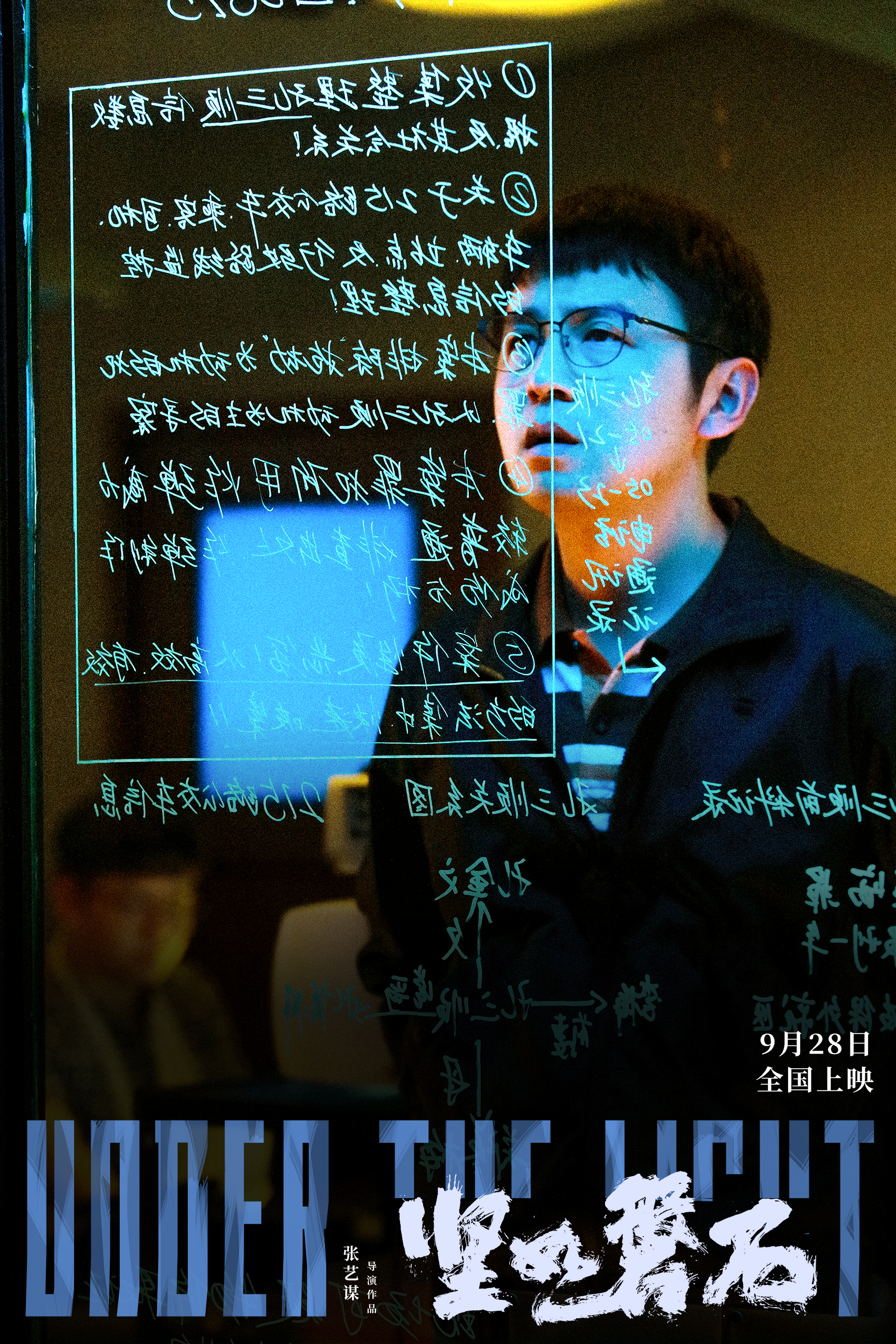
Lei Jiayin as Su Jianming
The Paper: Zheng Gang and Li Zhitian, this "two heroes" structure have already begun to oppose each other at the beginning of the movie, coercing and using each other, each other is playing "clear cards", which is actually not easy to write.
Chen Yu: This relationship between them may be the most attractive relationship among the characters in the movie. I tried to construct a "horrible balance" between them - they did not just meet, but have colluded and collaborated a lot. In the years, each side has the other's "dirty information" and "preparations". The battle between them is like two big guys in a card game playing cards against each other. Even if they injure the enemy a thousand and lose eight hundred to themselves, they can't stop. They compete with each other to see who can give in first. Because when they are in the position they are in in the movie, they have to protect themselves, their lives and their status, and they must be bloody when they play their cards.
This setting can also be related to the "Nash equilibrium", that is, when each player's equilibrium strategy is to achieve the maximum value of his expected return, at the same time, all other players are also following such a strategy.
The Paper: In this way, a kind of restriction and balance was formed between the two parties. As their fight against each other escalated, it gave Su Jianming a starting point to investigate the case. In the words of the supervisory team leader played by Chen Daoming in the movie, it is like adding more firewood to the bottom of the cauldron and watching the boiling water keep bubbling.
Chen Yu: Yes, outside this set of terrorist balance relationships, both Zheng Gang and Li Zhitian wanted to use Su Jianming, so it became "The Romance of the Three Kingdoms". As a "pawn across the river", Su Jianming joined the task force in confusion at first. He had his own intuition about the case, but he was not very clear about the development of the situation. As he, the "pawn", moved forward step by step, In the end, both guilty parties were pushed into the corner, and the case was solved instead.
In this little character like him, the audience will see the light of humanity, including Li Huilin played by Zhou Dongyu, Yang Xiaowei played by Lin Boyang, and even Xiaowei's aunt. This kind of light of humanity can be seen in ordinary people. In contrast, Zheng Gang and Li Zhitian were coerced by infinitely magnified desires, showing the evil of human nature to the level of spectacle.
Each of us has to face the darkness of human nature, which comes from our desires, the most typical of which are power and money, which constantly attracts us like a black hole. Some people can avoid this alienation, or instinctively fight against it, but some people will be trapped by this alienation and will never recover. If you have watched the movie, you will know that this tragedy was buried twenty or thirty years ago.
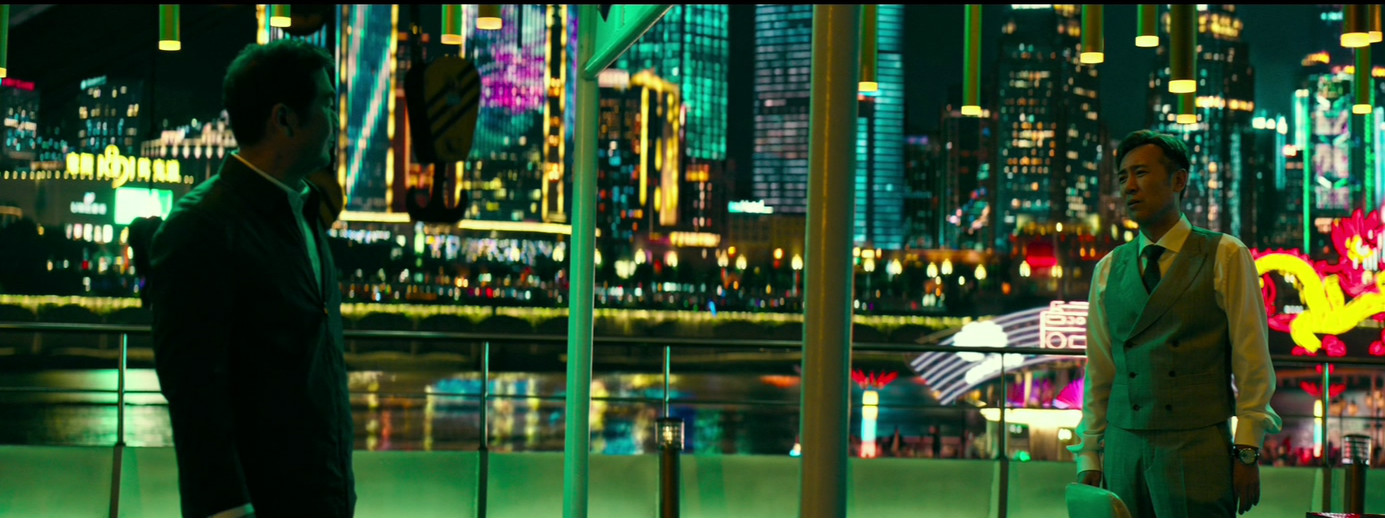
Zheng Gang and Li Zhitian, openly and secretly, antagonized and coerced each other.
The Paper: There is a prop in the movie, a bamboo stick used by Li Zhitian as a porter when he made his fortune. This is not only a symbol of his low-level status, but also the murder weapon in the movie. It is also the hiding place of the key evidence of the USB flash drive that finally "overturned a whole boat of people".
Chen Yu: When writing the script of "Solid as a Rock", I had the mentality of writing an epic about people at the bottom. Due to space limitations, I couldn't explain Li Zhitian's history clearly. He came to this position step by step from the bottom. Up, keep climbing up. "Scholars, farmers, industry and commerce" in the movie is the key word here. In the view of Zheng Gang's wife He Xiuli, a true "second generation", Li Zhitian has always been a nouveau riche, someone who can be used to do "dirty work". He started his career as a porter and eventually died.
The Paper: Most of the supporting roles in the movie are played by veteran actors. Can you talk about their portrayal?
Chen Yu: To sum up, all the protagonists and supporting characters in the movie have complex and embarrassing aspects. They are all living people in life, rather than functional symbols. Everyone has his own considerations, his own thoughts, his own standpoint and his own place of thinking. For example, the leader of the supervision team played by Chen Daoming and the public case chief played by Xu Yajun are positive characters and represent the will of the country. They both talked to Zheng Gang and Su Jianming respectively. For Zheng Gang, I made it clear that everyone must be investigated, which means you are no exception. To Su Jianming, Su Jianming asked them, who should I suspect? The police chief’s reply to him was, “Everyone must be suspicious, including me.”
Within the villain Jin Wu Group, I buried a sinister thread that connects people's hearts before and after the transfer of power. Liu Feng, assistant to the president played by Li Naiwen, why did he quietly investigate David's cheating and betrayal after Li Zhitian announced that he recommended his son-in-law as the successor of the group? Including Tang Danian's reaction at the scene, he was also one of the founders of the group, but he was the first to state that he was not the leader. He also pretended to be mysterious and said that he had a request: David must marry the boss's daughter before taking over. Everyone was stunned at first, and then smiled one after another - I wrote him as the "Smiling Tiger". With this foreshadowing, it would not be so abrupt that he stabbed the boss in the end. In other words, anyone who can get into this game is not stupid.
The Paper: Several of the meals in the movie are impressive. What do you think of Chinese dining?
Chen Yu: I try to give each meal a different temperament. Zheng Gang, He Xiuli, and Su Jianming ate as a family with dark humor. The father had a paternalistic style, the mother was calm and authoritative, and the son used to be witty in his words from time to time. The scene in which Li Zhitian treats guests to dinner is to show his domineering and arrogance. While listening to his daughter playing Mussorgsky's piano suite "Pictures at an Exhibition" abroad, he calmly asked people to put their hands into the boiling water. hot pot to get the phone.
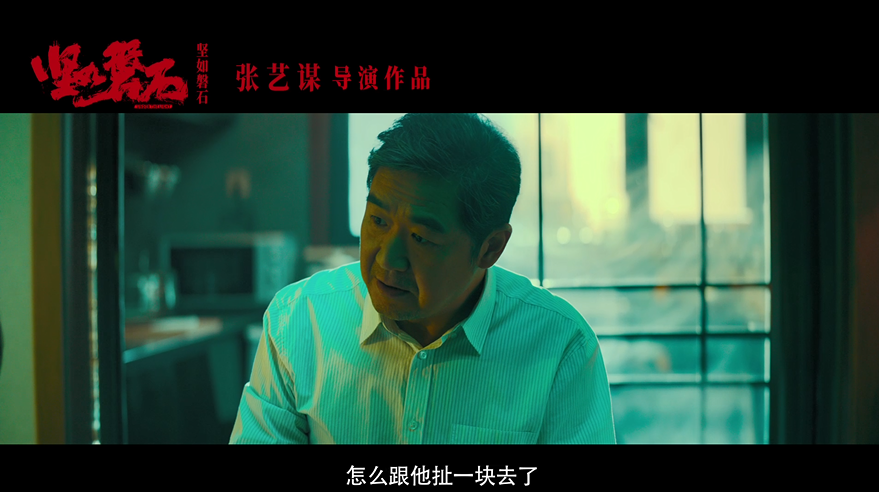
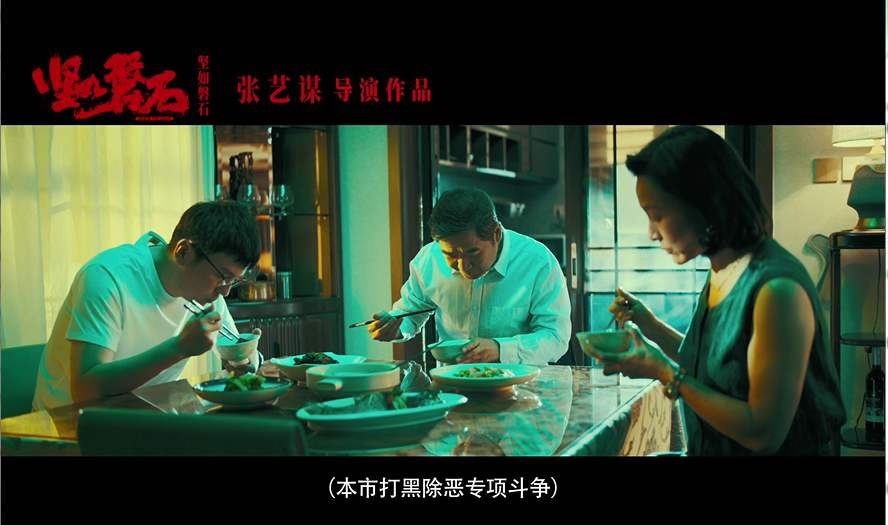
Dinner with black humor
The Paper: Although the film’s cast was positioned as a “carefully selected cast” during promotion, please talk about the three women in the film, Li Huilin, He Xiuli and Yang Xiaowei.
Chen Yu: It was originally decided that Li Huilin would be played by Zhou Dongyu. I tried to distance her from her previous character image based on Zhou Dongyu’s characteristics. This time she is dressed as a contemporary girl with short hair and glasses. She is an outspoken contemporary girl. Every character in the movie is entangled and calculating, but not Li Huilin. She knew that when this "box" was opened, she had to get to the bottom of it as a police officer. She would stand in front of her loved ones when in danger, including her sacrifice, which was sudden and unprepared. I particularly like the contemporary nature and genuineness of this girl.
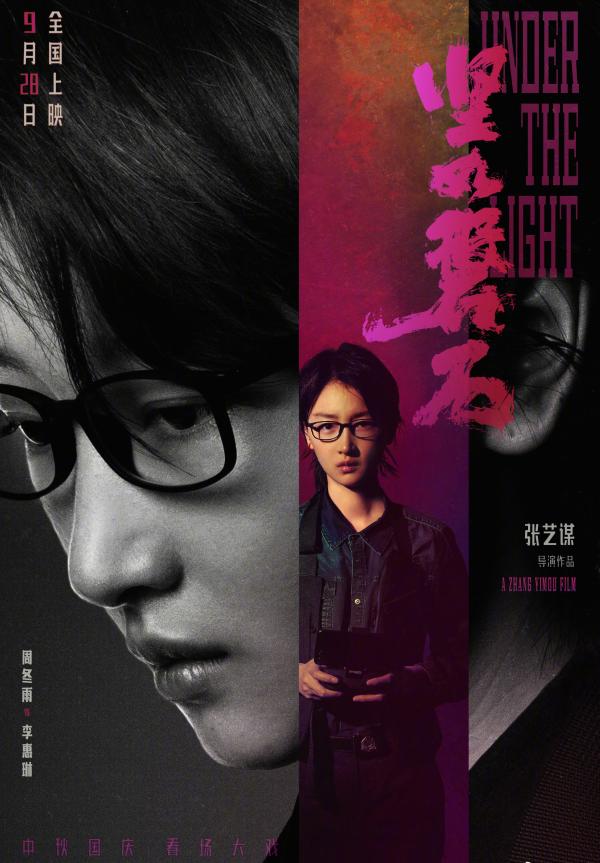
Zhou Dongyu as Li Huilin
The character He Xiuli is the daughter of a high-ranking cadre and the wife of a high-ranking official. She must have her own set of behavior patterns and value judgments. Her desire for control is spread in all aspects. In the original script, she was more action-oriented. In the final scene of snatching the mobile phone, she and Zheng Gang had a more complicated interaction. I originally wanted to write a story about "Tiger Poison Eats Son" for this scene. After He Xiuli gave the order, Zheng Gang instinctively gave her a He Xiuli slapped the slap back with her backhand and stared at him...
Yang Xiaowei is an ordinary girl. The film gives her the biggest choice in her life: take away 10 million, but betray her aunt, who shares the same love with her as mother and daughter; or face threats to her life. What choice did she make? The film does not show it directly, which is also a blank for the audience. I think each audience will speculate on her decision based on their own values.
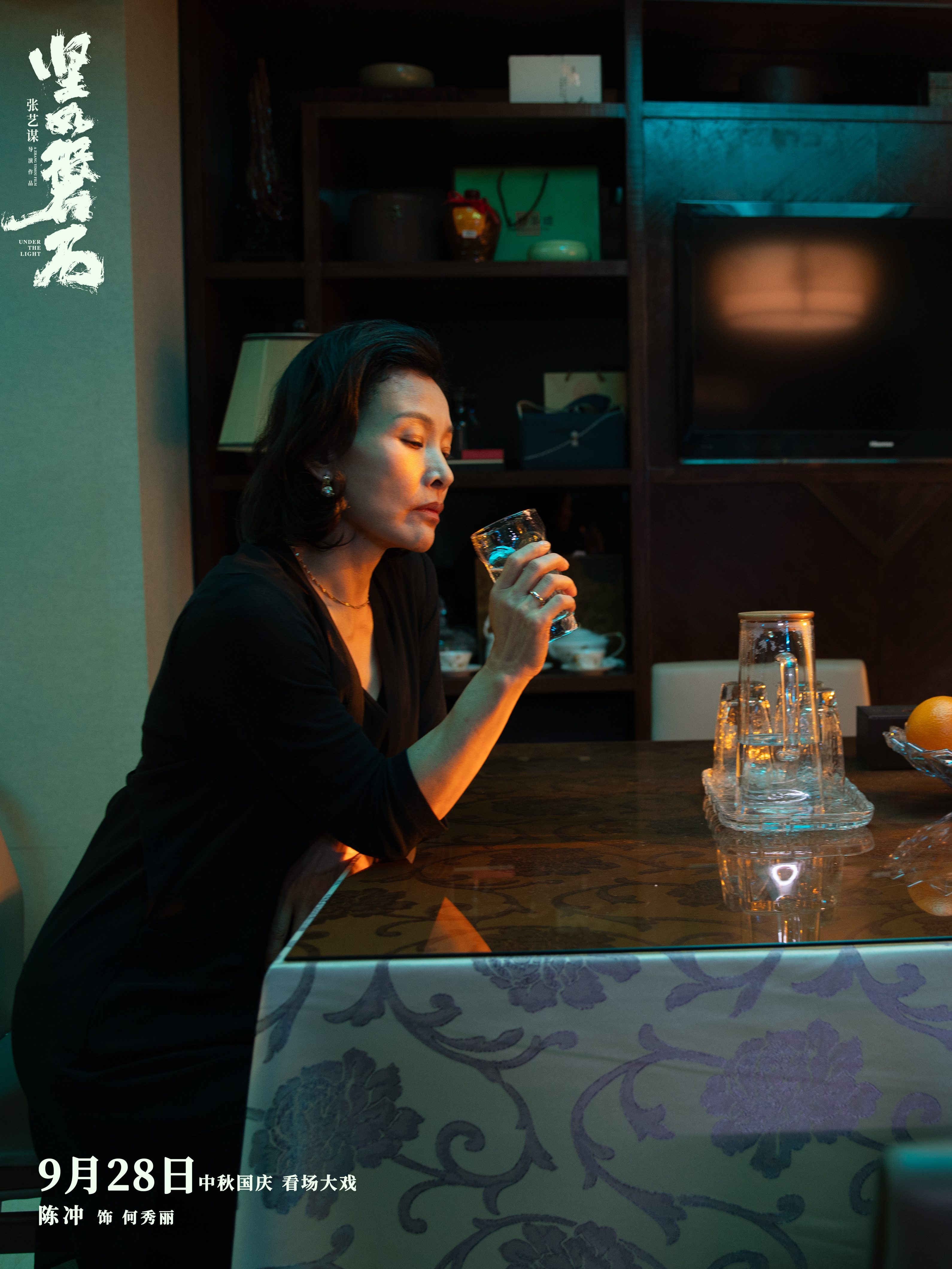
Chen Chong as He Xiuli
Crime film in the city, colorful night scenes
The Paper: The story background of "Sturdy as a Rock" is set in a metropolis. What are your own observations and thoughts about such a story setting?
Chen Yu: When I first came into contact with Director Yimou to discuss the format of this film, in addition to showing him the script, I also shared an essay "Crime" that I published in "Contemporary Film" (Issue 2, 2018). I gave him "Analysis of Film Genre and Its Development in Mainland China", which contains some of my thoughts on this genre.
When we talk about genre movies, we often see two major misunderstandings: one is to confuse genre with subject matter; the other is to expand the boundaries of a single genre. Within the genre film system, crime films overlap with genres or sub-genres such as gangster films, gangster films, police films, detective films (mystery films), and action films, and there is a complex and subtle process of iteration, fusion, and differentiation.
Why crime films often set their stories in a legally protected space like the city is because there is law and order here, and the conflict and tension between order and crime are the most important genre elements of crime films. When a criminal commits a crime, he should understand what order is and he should avoid the punishment of order. Of course, crimes can also occur in the countryside or wilderness, but there is a natural self-consistency in placing crime films in metropolitan areas. Cities are not only the source of desire, but also the place where rules are most perfectly constructed.
The Paper: In your opinion, what are the top crime films?
Chen Yu: When I wrote this movie, I compared it to some well-known crime films in film history, too numerous to count. In fact, the same is true for those top crime films. They cannot just be obsessed with showing violence. They are not violent for the sake of violence, but to reveal deeper things through violence.
Rather than saying that "Solid as a Rock" is about the tragedy of human darkness, I wanted to present the shining light of humanity against this darkness. I once said that my idol is Aristotle. Aristotle talked about the main social effect of drama in "Poetics", which is to purify and cultivate emotions. Tragedy is to purify such emotions through pity and fear.
The Paper: The English title of "Solid as a Rock" is "Under the Light", which reminds me of Zhang Guoli and Jiao Huang's lines in the TV series "Loyalty", "There are shadows behind tall buildings, and there are blood and tears under the neon lights." In terms of lighting, the film uses highly saturated contrasting colors, which has echoes of cult films and even Italian yellow films of the 1960s and 1970s. What do you think of this?
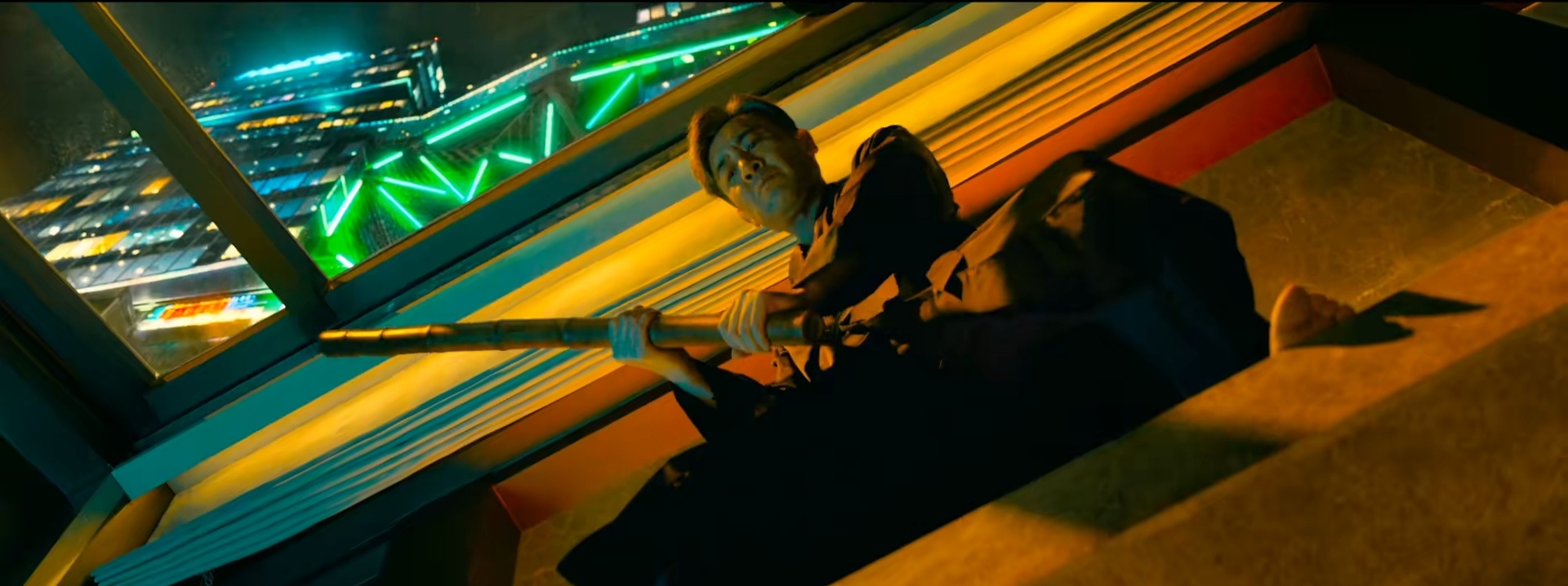
Colorful night scenes in "Sturdy as a Rock"
Chen Yu: Ha, director Yimou attributed the color of this movie to cyberpunk style. The English title of the movie literally translates to "Dark Under the Light". After director Yimou read the script, he once said to me, have you discovered it? 80% of the scenes in this script take place at night, so I decided to use night scenes in this movie. As soon as he said this, the production company was very nervous, because Hollywood's big data found that night scenes are not popular. (laugh)
But the director was very confident. Although he asked for night scenes, they were bright night scenes, full of all kinds of lights that overflowed the eyes. To this end, he also set up a "reflection team" in addition to the lighting team, which worked together with lights and specular reflection. Photographer Luo Pan played an indispensable role in the specific implementation this time. In my opinion, he is already one of the best photography directors in the contemporary Chinese film industry. During one of my visits to the studio, I heard him shouting on the set, "The lights are not bright enough! The reflection is not enough!" In the current film, we will see that black is the background, and at the same time there are weird and colorful night scenes.
The Paper: Making movies is your long-cherished wish, but it is said that you have already started cooperating with director Zhang Yimou on your fourth film. When will you prepare to direct a film written by yourself in the future?
Chen Yu: I am not obsessed with whether I am a screenwriter or a director in film creation. In my opinion, they are both tellers of original stories. A movie director and a party director are both called directors, but there is actually a long distance between them. On the contrary, a director may have a closer relationship with a novelist or a storyteller. As long as I can become the core storyteller, I will find the joy of life and my own value. Of course, I may also become a director and make films in the future.
In short, storytelling is my profession, and I am a professional storyteller.


